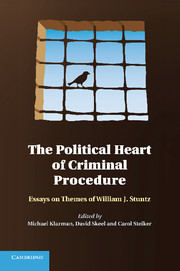Book contents
- Frontmatter
- Contents
- Contributor List
- Introduction: Appreciating Bill Stuntz
- Part I The Political Economy of Substantive Criminal Law
- Part II Police Investigations
- 5 The Accidental Feminist
- 6 The Distribution of Dignity and the Fourth Amendment
- 7 Why Courts Should Not Quantify Probable Cause
- 8 DNA and the Fifth Amendment
- Part III Emotion, Discretion, and the Judicial Role
- Index
- References
8 - DNA and the Fifth Amendment
Published online by Cambridge University Press: 05 March 2012
- Frontmatter
- Contents
- Contributor List
- Introduction: Appreciating Bill Stuntz
- Part I The Political Economy of Substantive Criminal Law
- Part II Police Investigations
- 5 The Accidental Feminist
- 6 The Distribution of Dignity and the Fourth Amendment
- 7 Why Courts Should Not Quantify Probable Cause
- 8 DNA and the Fifth Amendment
- Part III Emotion, Discretion, and the Judicial Role
- Index
- References
Summary
Bill Stuntz caused me trouble for as long as I can remember. He first caused me trouble as a young lawyer, because as a public defender I had grown pleasantly accustomed to throwing constitutional rights at all the perceived ills of the criminal justice system. You know that old saw, “when all you have is a hammer, everything looks like a nail”? Well, to a public defender, every problem looks like a potential motion. To thus be told that in fact it was my motion that was the problem – well, that was disconcerting. Reading Bill Stuntz's work may have convinced me to put down my hammer, but it left me wanting to reach for a match.
Fortunately, I managed to overcome such destructive impulses and joined academia in order to think constructively about the criminal justice system. Unfortunately, that just brought me to my second problem with Stuntz, which is the one that I encountered as a young scholar and continue to encounter even today. That problem is this: Every time I think I have some new idea or path-breaking original thought, I do a little research only to find that Bill Stuntz already had the same realization years earlier and, worse yet, published something about it. In fact, he usually wrote better, more clearly, and with more nuance and careful understanding than I ever could. But it was always hard to become too upset, since if I had to get scooped, I cannot think of a nicer or smarter person to claim as having preempted me.
- Type
- Chapter
- Information
- The Political Heart of Criminal ProcedureEssays on Themes of William J. Stuntz, pp. 144 - 160Publisher: Cambridge University PressPrint publication year: 2011

